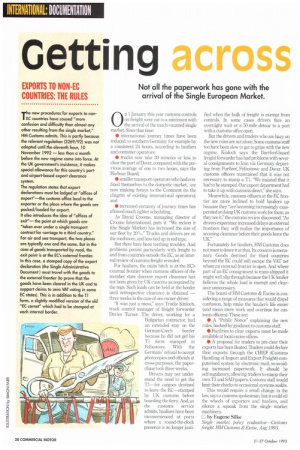Getting acrose 0 n 1 January this year customs controls
Page 42

If you've noticed an error in this article please click here to report it so we can fix it.
on freight were cut to a minimum with the arrival of the much-vaunted single market. Since that time:
• international journey times have been reduced, to southern Germany for example by a consistent 24 hours, according to hauliers and container operators; • trucks now take 30 minutes or less to clear the port of Dover, compared with the previous average of one to two hours, says the Harbour Board; • smaller transport operators who had confined themselves to the domestic market, are now making forays to the Continent (to the chagrin of existing international operators); and • increased certainty of journey times has allowed much tighter scheduling.
As David Croome, managing director of Croome International, puts it: "We reckon it (the Single Market) has increased the size of our fleet by 20%." Trucks and drivers are on the road more, and less tied up in red tape.
But there have been teething troubles. And problems persist particularly with freight to and from countries outside the EC, as an internal review of customs freight revealed.
For hauliers, the main hitch is at the EC's external frontier when customs officers of the member state discover export clearance has not been given by UK customs as required by the regs. Such loads can be held at the border until retrospective clearance is obtained — three weeks in the case of one owner-driver.
it was just a mess," says Trudie Kinloch, truck control manager of freight forwarder Davies Turner. The driver, working for a Bulgarian contractor, had an extended stay on the German/Czech border because he did not get his T1 form stamped in Felixstowe. With the Germans' refusal to accept photocopies and officials at cross-purposes, the paperchase took three weeks.
Drivers may not understand the need to get the Ti—for cargoes destined to leave the EC—stamped by UK customs before boarding the ferry. And, as the customs service admits, hauliers have been inconvenienced at ports where a round-the-clock presence is no longer justi
fled when the bulk of freight is exempt from controls In some cases drivers face an overnight wait or a 50-mile detour to a port with a customs office open.
But the drivers and traders who are hazy on the new rules are not alone. Some customs stiff too have been slow to get to grips with the new regime. Kinloch says the Dartford-based freight forwarder has had problems with several consignments to Iran via Germany departing from Purfieet. Felixstowe and Dover. UK customs officers maintained that it was not necessary to stamp a TI. "We insisted that it had to be stamped. Our export department had to take it up with customs direct," she says.
Meanwhile, customs officers at the EC frontier are more inclined to hold hauliers up because they "are becoming increasingly exasperated at doing UK customs work for them, as they see it," the customs review discovered. "As drivers experience increased delays at external frontiers they will realise the importance of securing clearance before their goods leave the UK" Fortunately for hauliers, HM Customs does not want to leave it at that. Its concern is mercenary. Goods destined for third countries beyond the EC could still escape the VAT net where an external frontier is open. And where part of an EC consignment is trans-shipped it might well slip through because the UK haulier believes the whole load is exempt and clearance unnecessary The board of HM Customs & Excise is considering a range of measures that would dispel confusion, help make the haulier's life easier (and mean more work and overtime for customs officers). These are: • A "Public Notice" explaining the new rules, backed by guidance to customs staff.
• Facilities to clear exports must be made available at local excise offices.
• A proposal for traders to pre-clear their exports has been floated. Traders could declare their exports through the CHIEF (Customs Handling of Import and Export Freight) cornputerised system by electronic mail, so avoiding increased paperwork It should be self-regulatory, allowing traders to stamp their own Ti and SAD papers. Customs staff would limit their checks to occasional systems audits.
This would require a small change in the law, says a customs spokesman, but it could oil the wheels of exporters and hauliers, and silence a squeak from the single market machinery.
E by Eugene Silke Single market policy evaluation—Customs freight. 1/1I/ Customs & Excise, Aug 1993.
































































































